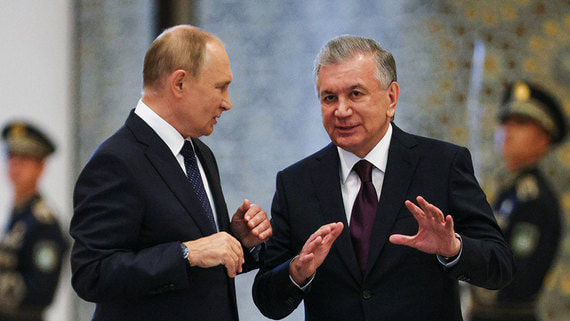Uzbekistan still does not want to go for excessive rapprochement with Russia
[ad_1]

Russia has not set political conditions for gas supplies to Uzbekistan, Russian presidential spokesman Dmitry Peskov said on December 8. Moscow’s proposed gas union with Kazakhstan and Uzbekistan is driven solely by commercial interests, he said. So Peskov reacted to the words of the Deputy Prime Minister of Uzbekistan Zhurabek Mirzamakhmudov cited by Reuters that the republic would never disagree on political terms in exchange for gas, and an agreement with Russia on gas supplies, if it is concluded, does not yet mean an alliance.
“Reuters misinterpreted the words. We know what was said. Nobody talks about gas in exchange for political conditions. This is out of the question in the context of the creation of this union. Naturally, we are talking about the commercial side, about coordinating actions in the commercial interests, first of all, of the participating countries,” informed Peskov.
The proposal made by Vladimir Putin during the talks in Moscow to create a union of Russia, Kazakhstan and Uzbekistan “to resolve issues in the gas sector” was first announced on November 28 by President of Kazakhstan Kassym-Jomart Tokayev. His press secretary Ruslan Zheldibai specified that the talk was about the creation of a “tripartite gas union” with the aim of “coordinating actions in the transportation of Russian gas through the territories of Kazakhstan and Uzbekistan.”
Later Russian President and Head of Uzbekistan Shavkat Mirziyoyev discussed issues of trade and economic cooperation by phone, and Deputy Prime Minister Alexander Novak declared December 2 that Uzbekistan is interested in the project gas union with Russia and Kazakhstan, since the republic needs additional gas supplies from the Russian Federation. He stressed that the parties are working on commercial and technical issues.
Uzbekistan and Kazakhstan export gas mainly to China. Gas export of Kazakhstan, according to the Ministry of Energy of the country, in 2021 amounted to 7.2 billion cubic meters. m, in 2022, supplies are expected to decrease to 5 billion cubic meters. m. Uzbekistan, according to OPEC, reduced gas exports in 2021 by 33.5% to 2.38 billion cubic meters.
The statement of Mirzamakhmudov, who refused to recognize the gas agreements as a “union”, is connected with the desire of the republic’s leadership to “take the issue” of gas supplies out of the political plane, while maintaining the economic benefits from such cooperation with Russia, Stanislav Pritchin, head of the Eurasian Development expert center, notes.
“Uzbekistan is interested in receiving Russian gas, because now it has actually turned into a gas importer. Domestic production is insufficient to provide for the population, to generate electricity and for the petrochemical complexes that have been launched there. Objectively, Uzbekistan is interested in cooperation with Russia. But the fear of sanctions is most likely what predetermines the overly cautious policy of “no alliances, no unions,” says Pritchin.
“The countries of Central Asia (CA) are under pressure from outside, and everything that goes into public discussion is very closely perceived by external players. The wording about the “gas union” sounded too “loud” for regional players against the backdrop of the fact that Central Asia wants to distance itself from Moscow in a certain sense against the backdrop of the Ukrainian crisis,” says Darya, Director of the Information and Analytical Center for the Study of Socio-Political Processes in the Post-Soviet Space Chizhov.
In fact, the statement does not mean that Uzbekistan has disowned the project – it is trying to reduce the information tension around it, level the political component and transfer it to a non-public commercial plane, the expert believes.
The main reason for Uzbekistan’s public refusal of an alliance with Russia is the fear of secondary sanctions, primarily from the United States, continues Ekaterina Arapova, director of the Center for Expertise on Sanctions Policy at the Institute of International Studies at MGIMO. “Uzbekistan has a very high debt dependence on international organizations, on private donors in the form of the United States, on European funds, whose share in the structure of external debt is also high. Uzbekistan is quite dependent on Western capital, on the capital of the initiators of sanctions, it is these countries that form the flow of direct investment in the economy of Uzbekistan,” she said.
According to Arapova, because of the decision of Uzbekistan, “the number and level of ties with friendly economies are politically reduced.” But at the same time, Moscow is now interested in diversifying its gas supplies, and Central Asia and East Asia can become one of its consumers, Chizhova recalls.
Pritchin emphasizes that an agreement on gas supplies can only be concluded in a trilateral format, “because we have [России и Узбекиcтана] there is no common border. He suggested that the official rhetoric of Kazakhstan, whose president was the first to talk about the idea of a tripartite alliance, would be similar to that of Uzbekistan.
“Kazakhstan is also interested in [его] the gas transmission system was activated. An increase in transit means an increase in transit payments. For pragmatic reasons, no one will refuse to cooperate, but everyone will take such a position for the West: “We are cooperating with Russia, but this cooperation does not have any political superstructures,” the expert believes.
The heads of Russia and Kazakhstan will have the opportunity to discuss the prospects for a gas union on December 9, when the meeting of the Supreme Eurasian Economic Council will take place in Bishkek. Vladimir Putin’s aide for international affairs Yuri Ushakov confirmed December 6 that the Russian leader plans to attend.
[ad_2]
Source link








